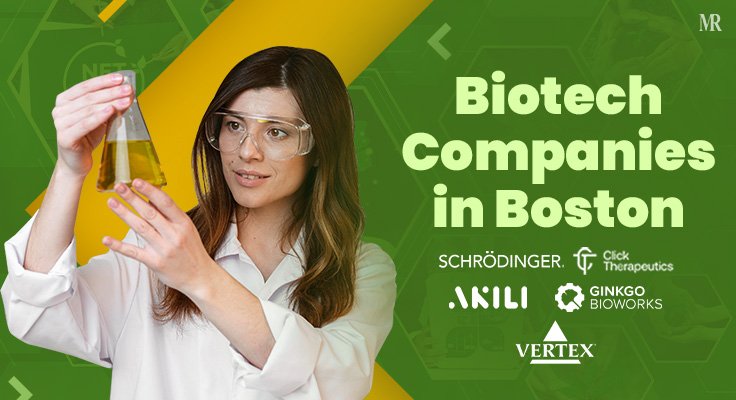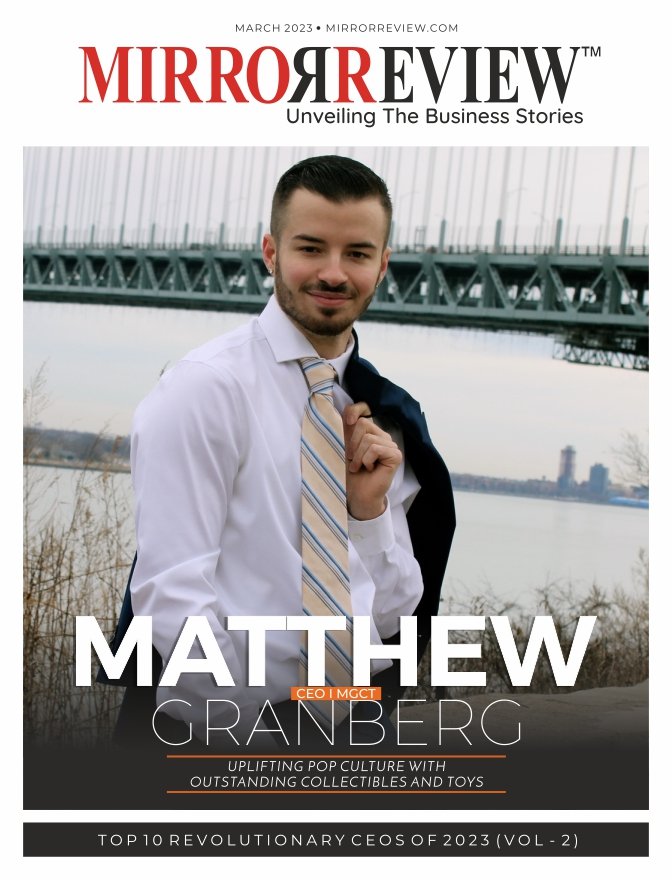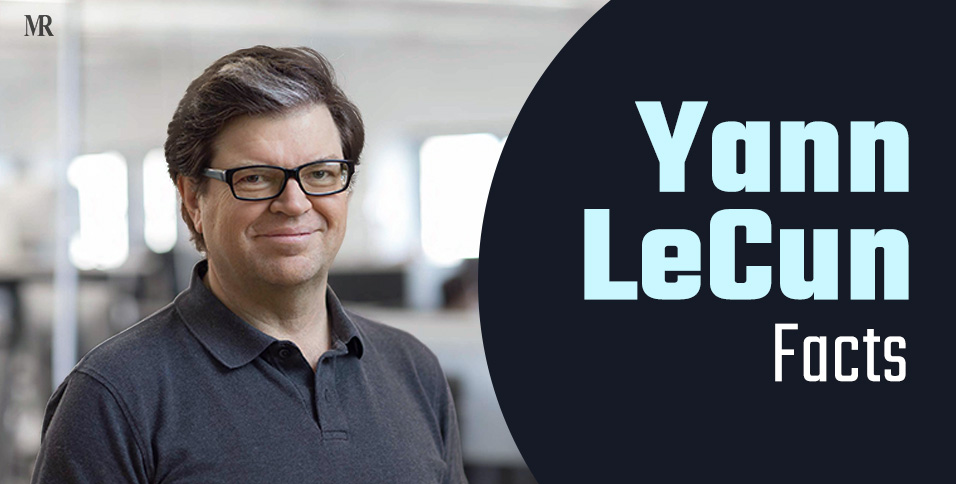Boston stands as the undisputed global heart of biotechnology. Often called “Bio-Boston” or simply “Kendall Square,” this region buzzes with scientific energy. Why here? World-class research institutions like Harvard and MIT fuel constant innovation. A robust venture capital flow, seeing $6.7 billion in biopharma VC funding globally in Q1 2025, continues to back de-risked assets. Boston also boasts an unmatched pool of skilled talent. It offers a truly collaborative ecosystem. This rich history makes it a vital hub for biotech companies in Boston.
This blog explores five pivotal biotech innovators in Boston for 2025. These are not just any firms. We look at Schrödinger, Click Therapeutics, Akili Interactive Labs, Ginkgo Bioworks, and Vertex Pharmaceuticals. They shape the future of medicine. This analysis goes beyond a simple list. It dives deep into their groundbreaking impact and unique contributions. As the city hosts the BIO International Convention this June 2025, we underscore Boston’s unparalleled influence on global biotech. This detailed look reflects expert insight into the industry.
The Landscape of Boston Biotech in 2025: Key Trends
Boston’s biotech scene in 2025 is buzzing with innovation. It shows dynamic and transformative trends. These span artificial intelligence, RNA therapeutics, and cell and gene therapies. Precision medicine, oncology, and digital therapeutics also play big roles. Even sustainability initiatives are shaping this hub.
The Rise of AI in Drug Discovery
Artificial Intelligence (AI) and machine learning (ML) are game-changers. They speed up drug development. This means better target identification. It also streamlines drug compound discovery. AI even optimizes clinical trials. Boston-based biotech companies in Boston lead these efforts. Insilico Medicine, Atomwise, and Reverie Labs are front-runners. Insilico Medicine recently moved its headquarters to Boston. It uses AI platforms. These generate new drug candidates. One, a TNIK inhibitor, is in Phase II trials. This is a big step.
Atomwise uses AI-driven neural networks. They speed up small molecule drug discovery. This company has made big deals. A $1.2 billion deal with Sanofi is one example. Reverie Labs recently joined Ginkgo Bioworks in Boston. It boosts AI drug discovery. It uses machine learning and physics-based models. These companies show Boston’s strength. They are changing pharmaceutical R&D through AI. By 2025, 30% of new drugs may come from AI. The AI in pharma market could hit $13.1 billion by 2034.
RNA Therapeutics Beyond Vaccines
RNA therapeutics are growing fast. mRNA vaccines showed their power. Now, RNA therapies include siRNA, ASOs, saRNA, and circRNA. Boston hosts major players. Moderna and Strand Therapeutics are two. They move beyond vaccines. They tackle rare diseases, oncology, and autoimmune issues. Moderna expands its mRNA platform. It creates personalized cancer vaccines. It also develops rare genetic disorder therapies. Strand Therapeutics designs smart mRNA therapies. These target cells precisely. They have oncology trials underway.
New delivery technologies help. Lipid nanoparticles (LNPs) are crucial. They solve RNA instability. They also improve tissue targeting. Conferences like the 5th mRNA-Based Therapeutics Summit happen in Boston. This highlights the city’s role. It is a global RNA innovation hub. The RNA market could grow from $5 billion to over $40 billion by 2030.
Advancements in Cell and Gene Therapies
Cell and gene therapies keep moving forward. Improvements happen in scalability and manufacturing. Their uses in clinics are expanding. Boston-based biotech companies in Boston lead here. Tessera Therapeutics, Vertex Pharmaceuticals, and ElevateBio are key. They innovate in gene editing and cell manufacturing. Vertex made history with CRISPR-based therapies. Casgevy for sickle cell disease is one example. It offers a “one-time transformative therapy.” Vertex also tackles manufacturing access problems.
Tessera Therapeutics pioneers Gene Writing™ technology. It delivers “in vivo” genome engineering. Progress shows in preclinical programs in Boston. Manufacturing innovations include automation. Stable cell line development also helps. These boost scalability and cut costs. They are vital for broader patient access. Boston’s strong bioprocessing helps. Collaborations reinforce its global lead in advanced biologics.
Precision Medicine and Personalized Care
Precision medicine thrives in Boston. It uses multi-omic data and AI. Advanced diagnostics also help. This delivers personalized therapies. These treatments fit each patient’s genetics and lifestyle. Focus areas include biomarker validation. Personalized oncology and pharmacogenomics also guide treatments. This improves effectiveness and reduces side effects. AI models enhance clinical decisions. They use genomic, clinical, and imaging data. This leads to more precise cancer therapies. It also creates tailored plans for complex diseases. Boston hosts many precision medicine events. These collaborative efforts advance personalized healthcare.
Oncology: A Key Investment Area
Oncology remains a major focus. Boston’s biotech investment drives it. Advances in targeted therapies and immunotherapies are key. AI-enabled drug discovery also contributes. This sector attracts big venture capital. Mergers and acquisitions (M&A) are common. There is strong interest in cell therapies. Antibody-drug conjugates and cancer vaccines also draw attention. Boston leads in precision oncology. Extensive research and clinical trials fuel this. Robust biotech ecosystems combine digital and genetic tech. Major events in Boston highlight oncology innovation.
The Rise of Digital Therapeutics
Digital Therapeutics (DTx) are growing fast. These are software-driven treatments. Boston’s biotech scene sees their rapid rise. Companies like Click Therapeutics and Akili Interactive Labs are active. They develop software as medical devices. These address neurological, psychiatric, and behavioral disorders. Click Therapeutics has offices in Boston. It offers prescription digital therapeutics. These target depression, migraine, and schizophrenia. They expand their clinical pipeline.
Akili specializes in video game-based digital medicines. These aim to improve cognitive issues and ADHD. Akili continues to innovate in personalized digital therapeutics. They use neuroscience and technology. The DTx field benefits from AI. It also gains from FDA regulatory progress. Growing reimbursement models also help. An “Advancing Digital Therapeutics Summit 2025” happened in Boston in February.
Sustainability: A New Biotech Priority
Sustainability is a growing priority. Boston’s biotech industry focuses on it. This means eco-friendly manufacturing. It also involves waste reduction and energy savings. Green biotechnology replaces polluting materials. It uses bio-based alternatives. It adopts clean technologies. Biocatalysis reduces chemical use and hazardous waste. Industry leaders integrate ESG principles. They invest in sustainable bioprocessing. They also promote innovation. The goal is to lessen environmental impacts. This happens without hurting quality or safety. These efforts match global trends. They aim for greener, competitive biotech manufacturing. The BIO 2025 convention in Boston emphasizes a “more sustainable biomedical future.”
Here are the 5 biotech companies in Boston
| Company | Founded | Core Focus |
| Schrödinger, Inc | 1990 | Physics-based computational platform for drug discovery and materials science; molecular simulations. |
| Click Therapeutics | 2012 | Prescription digital therapeutics—software-based medical treatments for unmet clinical needs. |
| Akili Interactive Labs | 2011 | Digital therapeutics for cognitive impairments, especially ADHD, via FDA-cleared video game treatments. |
| Ginkgo Bioworks | 2008 | Cell programming and synthetic biology—engineering custom microbes for diverse industrial uses. |
| Vertex Pharmaceuticals | 1989 | Not in search results; known for small-molecule drugs, especially for cystic fibrosis. |
1. Schrödinger, Inc
Schrödinger, Inc. transforms drug discovery. It uses a special physics-based computer platform. This speeds up finding new molecules. These molecules are for drugs and materials. Its main work includes drug discovery platforms. It also focuses on computational molecular design. Materials science is another key area. The company uses advanced physics-based modeling. It combines this with machine learning. This helps optimize medicines and materials.
Core Focus and What They Do
Schrödinger builds top-tier computer platforms. These platforms predict molecule properties. They help biopharmaceutical, biotech, and industrial firms. This speeds up drug and material innovation. Their approach is multi-faceted. It includes:
- Physics-based molecular simulation.
- Quantum mechanics modeling.
- Machine learning in drug design.
- Enterprise informatics platforms for teamwork.
- Developing drug discovery programs. These target validated disease areas.
Key Innovations and Breakthroughs
Schrödinger developed a key tool: FEP+. This is a physics-based method. It accurately predicts molecule binding. This greatly helps in lead optimization for drug discovery. Their platform also has other tools. Glide is for virtual screening. Prime helps predict protein structures. LiveDesign is for team-based molecular design.
In therapeutics, Schrödinger develops its own drug candidates. One is SGR-1505. This oral MALT1 inhibitor targets B-cell cancers. It is in Phase 1 trials. Initial data was presented in June 2025. SGR-3515 is another. It is a Wee1/Myt1 inhibitor. It treats advanced solid tumors. SGR-4174 is a strong SOS1 inhibitor. It targets KRAS mutant cancers. These programs are breakthroughs. They use Schrödinger’s strong computational skills.
Schrödinger also pioneers AI-integrated simulations. These use physics-based methods. Machine-learned force fields also play a part. They make molecular predictions faster and more accurate. This benefits drug discovery and materials science. This shows their strong impact on biotech companies in Boston.
Impact and Significance in the Boston Biotech Ecosystem
Schrödinger’s platform significantly influences Boston biotech. It is a critical technology here. The company has a Cambridge, Massachusetts office. This strengthens its local presence. Top pharmaceutical companies license their platform. Many startups in Boston use it too. This fuels drug discovery innovation. They collaborate with firms like Nimbus Therapeutics. They also work with Bristol Myers Squibb. Schrödinger’s tools accelerate research. This cuts costs and failure risks. This underpins Boston’s reputation. It is a top biotechnology hub.
Schrödinger also works on computational toxicology. They have a Gates Foundation-funded plan. This supports safer drug development. It predicts toxicity risks early. This is a vital step for global biotech.
Recent News and Developments (2024-2025)
Schrödinger saw significant progress in 2024-2025. They signed a major deal with Novartis. It is a multiyear, multi-target research deal. Schrödinger received $150 million upfront. This advances several drug candidates. Initial Phase 1 clinical data for SGR-1505 was presented in June 2025. This happened at major hematology conferences. This pushes their pipeline forward. They announced progress for Wee1/Myt1 and SOS1 programs. Promising preclinical data exists. These should enter clinics later in 2025.
They secured $9.5 million more from the Gates Foundation. This expands their predictive toxicology platform. It helps drug discovery for low- and middle-income countries. They led efforts to combine AI/ML with simulations. This enhances their platform’s performance. New software versions released in 2025. They offer better automation and AI/ML workflows. These help computational chemists.
Financially, Schrödinger showed strong growth. Software and drug discovery revenues rose in early 2025. Total revenue jumped 63% to $59.6 million in Q1 2025. Software revenue increased 46% to $48.8 million. Drug discovery revenue surged 237% to $10.7 million. This included $5.7 million from the Novartis deal. They keep expanding collaborations. Partnerships with Eli Lilly, Otsuka, and Bristol Myers Squibb deepen. This validates their platform’s industry impact.
2. Click Therapeutics
Click Therapeutics is a biotech company. It specializes in software-based medical treatments. These are called Digital Therapeutics™. Their main work is creating software platforms. These platforms treat brain disorders. They also target mental health issues. Heart and metabolism problems are also covered. They combine science with smart software. This helps manage many complex conditions.
Core Focus: Software as Medicine
Click Therapeutics mixes biology and technology. They deliver special digital medicines. These treat brain disorders. They also help with neuropsychiatric problems. Cardiometabolic diseases are another focus. Their products are software programs. Patients can use them alone. Or, they can use them with regular medicines. This helps manage diseases better. The company uses AI and machine learning. This makes treatments personal. It also helps patients get better results. Digital therapeutics offer many benefits. They provide real-time monitoring and feedback. They can also be cost-effective.
Key Innovations and Breakthroughs
Click Therapeutics has made big advances. They developed special digital treatments.
- Rejoyn™: This is an important one. It is the first FDA-approved digital medicine. It helps treat major depression. Click made it with Otsuka Pharmaceutical.
- CT-132: This is also a first. It prevents episodic migraine. The FDA approved it in April 2025. It cut monthly migraine days significantly. It reduced about 3 days from a baseline of 7.8.
- AspyreRx: This is an FDA-approved digital medicine for type 2 diabetes. Click also got other digital heart and metabolism therapies from Better Therapeutics. This expands their work.
They also launched Click SE™. This is a new product type. It means “Software-Enhanced Drug™” therapies. These combine their digital tools with regular medicines. This new way aims to boost benefits. It joins software with drug treatments. It helps with brain-related interventions. It also helps manage drug doses. It can even help with side effects. These innovations make them a key player among biotech companies in Boston.
Impact and Significance
Click Therapeutics leads in Digital Therapeutics™. They set a new standard of care. This joins software treatments with regular medical care. Their personalized platforms use AI. They offer safer and better treatments. These help with brain, mental, obesity, heart, and pain problems. Click Therapeutics fills big unmet needs. They combine science and software. This helps patients stick to treatment. It also improves health results.
Their FDA approvals are big news. Clinical trial successes also matter. They show that digital therapies work. They are accepted as real, regulated treatments. This puts Click at the front of this new medical field. They work with many pharma companies. Otsuka and Boehringer Ingelheim are examples. This shows their strong industry role. They help put digital treatments with standard drug development.
Recent News and Developments (2024-2025)
Click Therapeutics had big wins in 2025. They got FDA approval for CT-132. This was for episodic migraine prevention. It was their first neurology product approval. This expanded their digital treatment list. The company launched Click SE™ in late 2024. This started their software-enhanced drug therapies. This followed new FDA guidance. It guides combination drug-software treatments.
Click Therapeutics finished a Series C funding round in early 2025. They raised about $48.6 million. Dassault Systèmes and Medidata led this. The money focuses on drug development and growth. In May 2024, they bought assets from Better Therapeutics. This included FDA-approved digital tools for type 2 diabetes and obesity. It boosted their heart and metabolism programs.
They have ongoing clinical trials. These include therapies for schizophrenia. They partner with Boehringer Ingelheim. Other areas are opioid use disorder, and multiple sclerosis. Insomnia is also a target. Several candidates are in early stages. Their expanded work with Dassault Systèmes and Medidata is important. It aims to improve clinical trial design. It also helps commercialize digital therapeutics. This sets a new industry standard. It is for digital-plus-drug products. Click has a Boston office. This helps them stay connected to other top biotech companies in Boston.
3. Akili Interactive Labs
Akili Interactive Labs is a pioneering digital medicine company. It creates clinically proven digital therapies. These improve brain functions. They do this through engaging video games. Their main goal is software-based treatments. These help with brain and mental conditions. Examples are ADHD, autism, MS, and depression. They target the root cognitive issues, not just symptoms.
Core Focus: Gaming for Brain Health
Akili’s mission is to change healthcare. They use digital therapies. These combine neuroscience and technology. They actively engage and improve brain function. Akili’s products feel like high-quality video games. But they are medicines. They deliver tailored cognitive interventions. Smart programs personalize treatment for each patient. Their digital medicines directly target brain systems. These systems are key for attention and other brain tasks. This makes them a unique player among biotech companies in Boston.
Key Innovations and Breakthroughs
Akili’s main product is EndeavorRx. This is a breakthrough. It is the first and only FDA-cleared video game treatment. It improves attention in kids aged 8 to 12. These children have ADHD. EndeavorRx uses Akili’s special SSME™ technology. This means “Selective Stimulus Management Engine.” It gives specific sensory challenges. It also includes motor tasks. These are personalized. They adapt to improve attention over time.
Akili is growing its digital medicine pipeline. They are working on adult ADHD. Their EndeavorOTC platform handles this. They also target autism, MS, and depression. They look at pediatric ADHD beyond the first age group. The company finished over 20 clinical trials. About 2,900 patients took part. Many expert papers validate their approach.
Impact and Significance
Akili Interactive Labs has changed cognitive treatment. They combine gaming with science. They also follow strict rules for approval. Their work greatly helps the digital therapeutics industry. This places Boston as a leader. It makes Boston a top hub for biotech companies in Boston. Their method offers a non-drug option. This is important. Traditional ADHD drugs can have side effects. Akili’s presence in Boston adds depth. It mixes neuroscience, tech, and entertainment. This creates new ways for patient care. It helps improve health outcomes.
Recent News and Developments (2024-2025)
Virtual Therapeutics bought Akili in mid-2024. The deal was worth $34 million. Akili now works as a Virtual Therapeutics part. It stopped being publicly traded. This move combines Akili’s digital therapies. It adds them to Virtual Therapeutics’ VR mental health offerings. This also brings in gaming knowledge.
In early 2024, Akili reduced its staff. Sales were slow. They shifted strategy. They focused on selling EndeavorOTC over-the-counter. They also sought FDA clearance for this adult ADHD product. Akili started a Phase III study in 2025. This checks its digital ADHD treatment further. It helps expand the patient group. EndeavorRx keeps improving. New game features make it more personal. They also boost engagement for kids with ADHD. Positive clinical data supports this. It appears in well-known journals.
The company has raised over $270 million in total funding. Major investment firms backed them. These include Social Capital and Amgen Ventures. Jazz Venture Partners also invested. Akili works with top neuroscience groups. UCSF is one such group. Their technology came from UCSF research. The company filed over 40 patents. These relate to cognitive tests. They also cover psychiatric diagnosis and therapy. This shows their ongoing innovation in digital therapeutics. Akili exemplifies innovative biotech companies in Boston.
4. Ginkgo Bioworks
Ginkgo Bioworks is a leading biotech company. It is based in Boston. They program cells using synthetic biology. This creates custom microorganisms. They use these for many things. This includes drugs, farming, and industrial chemicals. Food and biosecurity are also key areas. Their main focus is synthetic biology. Bioengineering and organism design are central. They use advanced tech. This designs, builds, and improves biological systems. These systems are for commercial uses. Ginkgo is a true leader among biotech companies in Boston.
Core Focus: Programming Cells
Ginkgo Bioworks runs a very automated platform. People call it “cell programming.” They engineer bacteria, yeast, and mammalian cells. These are for specific industrial and health jobs. Their method combines huge data sets. It uses AI and machine learning models. Lab automation also plays a big part. This speeds up biological research and manufacturing. Their tech helps create new microbes. These microbes produce drug ingredients. They also make sustainable chemicals. Food ingredients, too, are a focus. Farming biologicals are another example. Enzymes, flavors, and fragrances are also made. Finally, biosecurity tools are key products.
Ginkgo’s platform is easy to access. Companies can do custom R&D projects. They can also get packaged services. Tools help partners speed up work. It has a special genetic “codebase.” This holds many biological parts. It helps design and test engineered organisms fast.
Key Innovations and Breakthroughs
Ginkgo’s main innovation is its “foundries.” These are automated labs. They can create and test thousands of engineered cells daily. These foundries make strain optimization faster. They also improve organism design. This means better consistency and scaling.
Ginkgo uses synthetic biology across many areas. They developed microbes. These make important compounds. Examples include special chemicals and drugs. They also create sustainable ingredients. Ginkgo engineered yeast. This yeast produces fragrance molecules. They include gamma-decalactone. Massoia lactone is another. Both are used in flavors and fragrances.
Ginkgo is growing in biopharma. They do advanced mammalian cell engineering. Their Bioworks7 facilities lead this. They target cell therapies and gene therapies. RNA therapeutics and biologics are also goals. They bought companies like Patch Biosciences. They also acquired Modulus Therapeutics. This strengthens their biopharma work.
Their Technology Network is growing. It includes many partner companies. It also has acquisitions. This brings together AI, genetic medicine, and biomanufacturing. It also covers biosecurity. This expands their platform’s abilities.
Ginkgo also helped with biosecurity. They played a big role during COVID-19. They gave testing and tracking services. They also found new therapies. This included tools for detecting engineered biothreats. This highlights their importance among biotech companies in Boston.
Impact and Significance
Ginkgo Bioworks is a big synthetic biology company. It greatly helps Boston biotech. They are a key innovator. They are also a major employer. They had over 840 employees as of June 2025. Their platform shows how automation and data work. It shows how synthetic biology can cut R&D costs. It speeds up product development. It also scales production well across many fields. This makes Boston a global biotech hub.
Ginkgo’s teamwork approach is strong. Their vast technology helps customers. Both startups and big companies get access. They get complex biological engineering help. This pushes innovation limits. It helps with sustainable manufacturing. It also helps with biotech drugs and farming.
Recent News and Developments (2024-2025)
Ginkgo showed strong financial performance. In Q1 2025, revenue grew 27%. It reached $48 million. This was from cell programming services. It also came from government deals. Major pharma partnerships also helped. Total revenue was $48.0 million. Cell Engineering revenue was $38.0 million, up 37%. Biosecurity revenue was $10.0 million. The company reported a GAAP net loss of $(91) million. Adjusted EBITDA was $(47) million. They had $517 million in cash.
Ginkgo acquired Zymergen in 2022 for $300 million. This expanded their platform. They also bought firms focused on cell and gene therapy tools. Ginkgo made deals with big players. One is with Bayer. They develop farming biologicals. They launched new biosecurity platforms. These use AI to fight biological threats. They received a $29 million contract from ARPA-H. This is to make essential medicines.
The company invested over $1 billion in its R&D platform. It has automated labs and AI tools. They expanded lab space in Boston. They built new, large facilities. These support scaling up. They keep developing biosecurity tools. These find engineered biological threats early. They work with government groups. This shows commitment to public health.
In May 2025, Ginkgo named Steven Coen as CFO. This highlights focus on financial stability. It also means streamlined operations. This happens amid strategic growth. Despite innovations, share prices are low. This was below $1 before 2024. They cut costs and had layoffs. Market doubts about value remain. Ginkgo is a key player among biotech companies in Boston.
5. Vertex Pharmaceuticals
Vertex Pharmaceuticals is a global biotech company. It is based in Boston, Massachusetts. Vertex focuses on making life-changing medicines. These are mainly for serious diseases. They focus on rare genetic disorders. Their main areas include gene editing. Cystic fibrosis, sickle cell disease, and pain management are key. They are also growing into autoimmune and nerve diseases. Vertex is a powerhouse among biotech companies in Boston.
Core Focus: Tackling Serious Diseases
Vertex’s main goal is scientific discovery. They create medicines that fix root causes of serious diseases. They use small molecules and gene-editing technologies. Their biggest focus has been cystic fibrosis (CF). They made amazing CFTR modulator therapies. These greatly improve patient lives.
Recently, Vertex moved into gene editing. Casgevy (exagamglogene autotemcel) is their big success. It is the first gene-editing drug. It works as a functional cure for sickle cell disease. The company also develops new therapies. These are for nerve disorders and pain. They also target autoimmune and inflammatory conditions. Diabetes is another area. This growth comes from new deals and internal research.
Key Innovations and Breakthroughs
Vertex has made many key breakthroughs.
- Cystic Fibrosis Therapies: Vertex led the way. They made the first drugs for CFTR protein defects. Orkambi and Trikafta are examples. These changed CF treatment globally.
- Casgevy: This drug was approved. It is the first gene-editing therapy for sickle cell disease. It offers a ‘functional cure.’ This shows Vertex’s leadership in advanced genetic medicines. As of early May 2025, over 65 treatment centers were active. About 90 patients received Casgevy. Its Q1 2025 revenue was $14.2 million.
- Non-Opioid Pain Therapy: Vertex created Journavx (suzetrigine). The FDA approved it on January 30, 2025. It is an opioid-free small molecule. It treats moderate-to-severe acute pain. This offers a new way to manage pain.
- Stem Cell Diabetes Therapies: Vertex bought Semma Therapeutics. They are advancing stem cell treatments. These aim to restore insulin in type 1 diabetes.
- Strategic Collaborations: Vertex partners for gene-editing delivery. They work with Moderna. They also work with Affinia Therapeutics. These deals develop mRNA-based and viral-vector gene therapies.
Impact and Significance in Boston and Wider Industry
Vertex is a vital player in Boston biotech. It shows how successful biotech innovation can be. They find and develop life-changing therapies. They have over $11 billion in revenue. This is mostly from CF programs. They keep expanding globally. The company is a big employer here. It helps Boston lead as a rare disease biotech hub.
Vertex also pushes gene editing limits. They push regenerative medicine too. They set industry standards. This applies to complex molecular medicines. They focus on patient needs. Their work includes internal research and new company deals. These make them a biotech powerhouse. They impact public health, drug innovation, and economic growth. This makes them a key contributor among biotech companies in Boston.
Recent News and Developments (2024-2025)
Vertex had key developments in 2024-2025. In June 2025, Vertex presented new data. This confirmed Casgevy’s long-term benefits. It showed durability in sickle cell disease. This strengthens its role as a major gene-editing therapy. They reported big benefits from ALYFTREK™. This is another important CFTR modulator. Data from the European CF Conference (June 4-7, 2025) showed ALYFTREK™ delivered deeper benefits. It also outperformed TRIKAFTA® in quality of life. The EMA also adopted a positive opinion for ALYFTREK™ on April 25, 2025.
The FDA approved Journavx in January 2025. This was a big moment. It is the first opioid-free pain treatment. Vertex is growing its pipeline. They are researching autoimmune and nerve disorders. This uses new company deals. Gene-editing collaborations continue. They renewed partnerships with top biotech firms. These include Moderna and Crispr Therapeutics.
Vertex shows strong sales. Q1 2025 total revenue was $2.77 billion. This was a 3% increase from Q1 2024. They also raised their full-year 2025 revenue outlook. It is now $11.85 billion to $12 billion. This is despite early 2025 cost pressures. Their pipeline is strong. CF product dominance also drives sales. Vertex works to make medicines accessible globally. This highlights their social responsibility. It shows their commitment to health equity for all.
Why Invest in Boston Biotech?
Boston’s biotech sector truly stands out. It remains a top global hub. This area shows strong economic impact. It offers promising investment chances for 2025 and beyond.
The Economic Powerhouse of Boston Biotech
Boston’s biotech industry fuels the local economy. More than 140,000 life sciences jobs existed in 2024. These are high-skill, high-wage roles. Average salaries reach nearly $200,000 annually. The life sciences sector will grow. It expects an 11.6% increase by 2029. This means over 16,600 new jobs. This growth outpaces Massachusetts’ overall economy by far. Its rate is just 3.4%. This signals robust long-term job prospects.
This sector’s health drives significant economic activity. Every $1 million of NIH federal funding creates $2.56 million in economic output. It also builds 8.2 jobs statewide. This shows strong benefits for the whole ecosystem. Boston hosts nearly 1,000 biotech firms. These include big pharma giants like Vertex Pharmaceuticals. Innovative startups also thrive here. This creates a dense cluster of advanced research and manufacturing. The region has over 41 million square feet of lab space. Recent years saw a surplus, creating high vacancy. This space surplus should normalize soon. The industry is adapting well. Despite some short-term job slowing, the core innovation remains solid for biotech companies in Boston.
Investing in Boston Biotech Opportunities
Venture capital investment in Massachusetts biotech bounced back. This occurred in 2024 and early 2025. Companies raised $7.89 billion in 2024. This was the first yearly increase since the pandemic. Early 2025 started strong with $1.2 billion in just two months. This shows renewed investor confidence. Boston, notably, beat Cambridge in venture funding in 2024. This reflects a shift towards mid- and late-stage biotech companies in Boston. Investment now spreads to suburbs like Watertown and Waltham. Larger funding rounds, or “megarounds,” are still common. They back clinic-ready drug candidates. This often means faster market paths. It also reduces risk for investors.
The 2025 BIO International Convention is in Boston. It highlights trends like AI-driven drug discovery. Oncology investment is another key area. Biotech manufacturing innovation is also a focus. This event brings global capital and industry leaders. It underscores Boston’s role as a vital biotech investment hub. Interest in AI, precision medicine, and new therapies continues. These areas draw significant venture and strategic funding for biotech companies in Boston.
Stability and Future Growth Potential
Boston’s biotech industry faces some short-term hurdles. These include federal funding cuts and regulatory uncertainty. A cautious investment climate also exists. Yet, deep-rooted advantages promise stability. Unmatched clusters of world-class universities are here. Hospitals, research institutions, and skilled talent also contribute. This creates a strong, resilient innovation ecosystem. State plans like the Massachusetts Life Sciences Act help. Ongoing public investments, hundreds of millions strong, support infrastructure. They also aid workforce training. These are crucial for staying competitive.
Concerns about NIH funding reductions remain. Regulatory personnel cuts could also slow approvals. The community actively addresses these issues. They use advocacy and strategic adaptation. Despite recent slow job growth, the long-term forecast is positive. It expects steady employment growth. There is ongoing demand for skilled workers. This demand spans research, manufacturing, and data-driven biotech. Boston’s biotech scene is ready for recovery. Market conditions are improving. IPO activity and M&A deals are rising. Companies like Vertex and Sionna Therapeutics boost investor confidence. The sector strives for better efficiency. It also aims for greater scalability. It uses advanced tech and flexible talent models. This helps navigate financial challenges for biotech companies in Boston.
Key Takeaways
Boston’s biotech landscape offers a compelling narrative. It shows both great innovation and strategic evolution. This region excels by integrating cutting-edge science with smart business. For instance, the rise of AI in drug discovery, seen in Schrödinger, is not just theoretical. It creates tangible clinical progress. This efficiency cuts costs. It also speeds up new drug development. The shift to digital therapeutics, exemplified by Click and Akili, truly transforms patient care. It provides accessible, non-traditional treatment methods. This addresses unmet needs, especially in brain health.
Furthermore, Boston’s strengths in synthetic biology, led by Ginkgo, promise profound shifts. This ranges from sustainable manufacturing to advanced biopharma. The continued leadership of Vertex in gene editing reshapes disease treatment. It offers ‘functional cures’ for previously untreatable conditions. These developments are not without challenges. Fluctuations in funding and market sentiment test resilience. Yet, the underlying ecosystem remains robust. It fosters deep scientific talent and strong academic ties. Boston’s biotech companies in Boston are not just surviving. They are actively defining the future of medicine. This vibrant hub continues to drive progress. It demands close attention from global investors and innovators.












